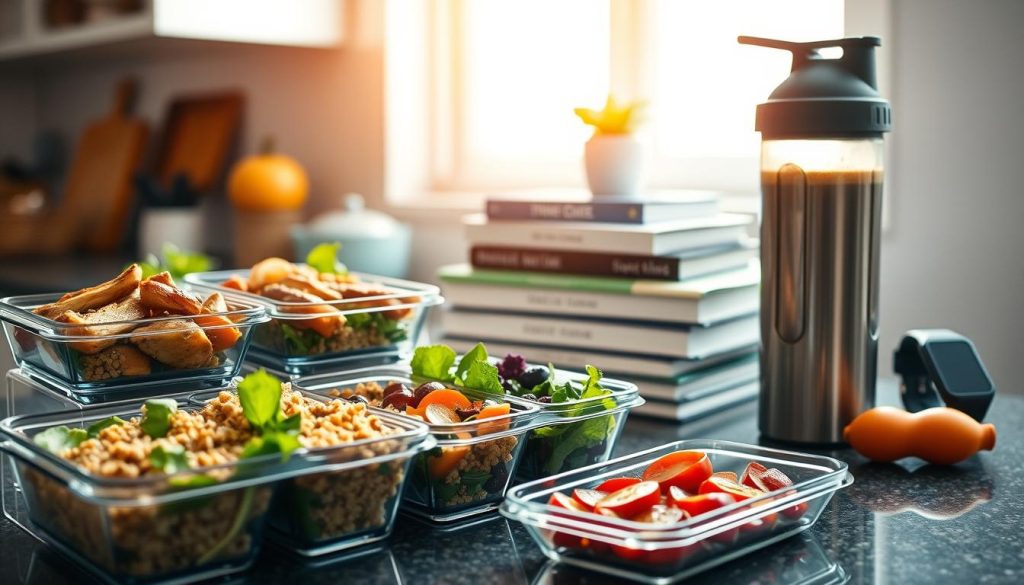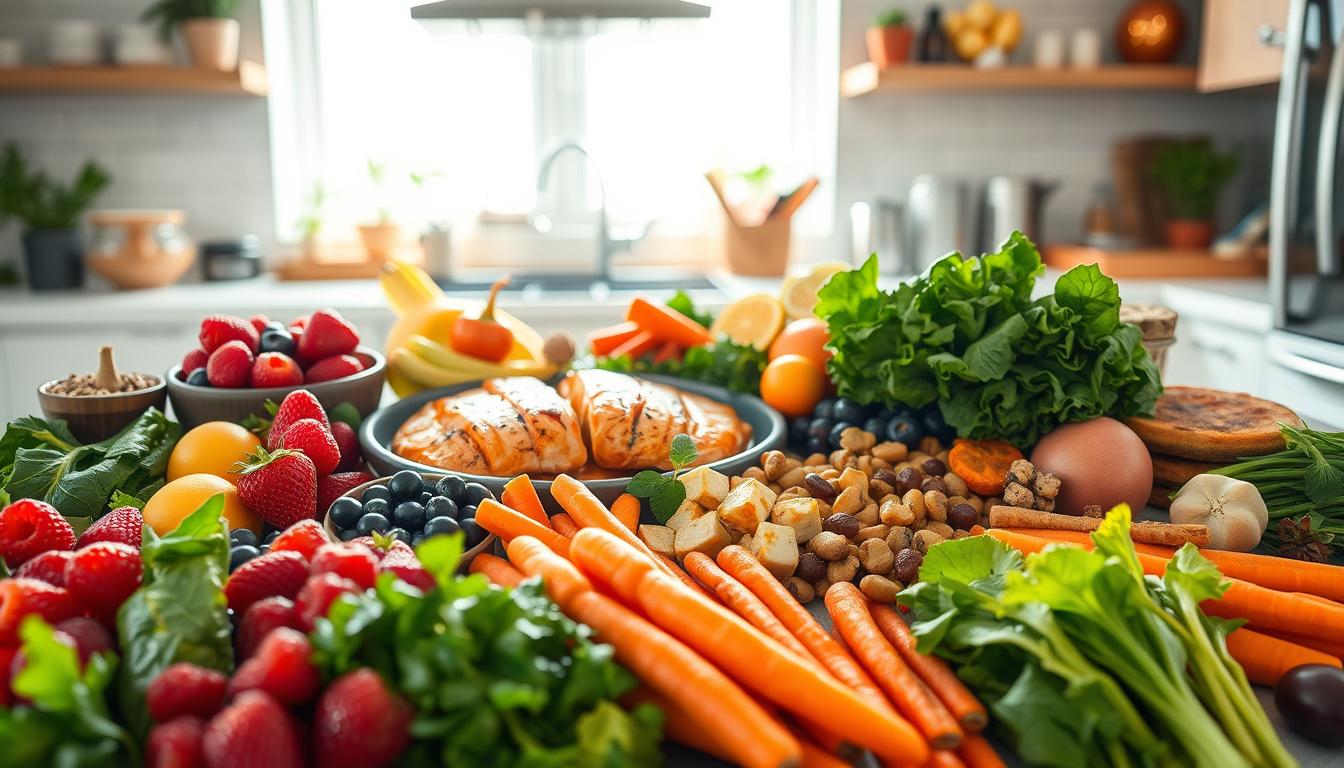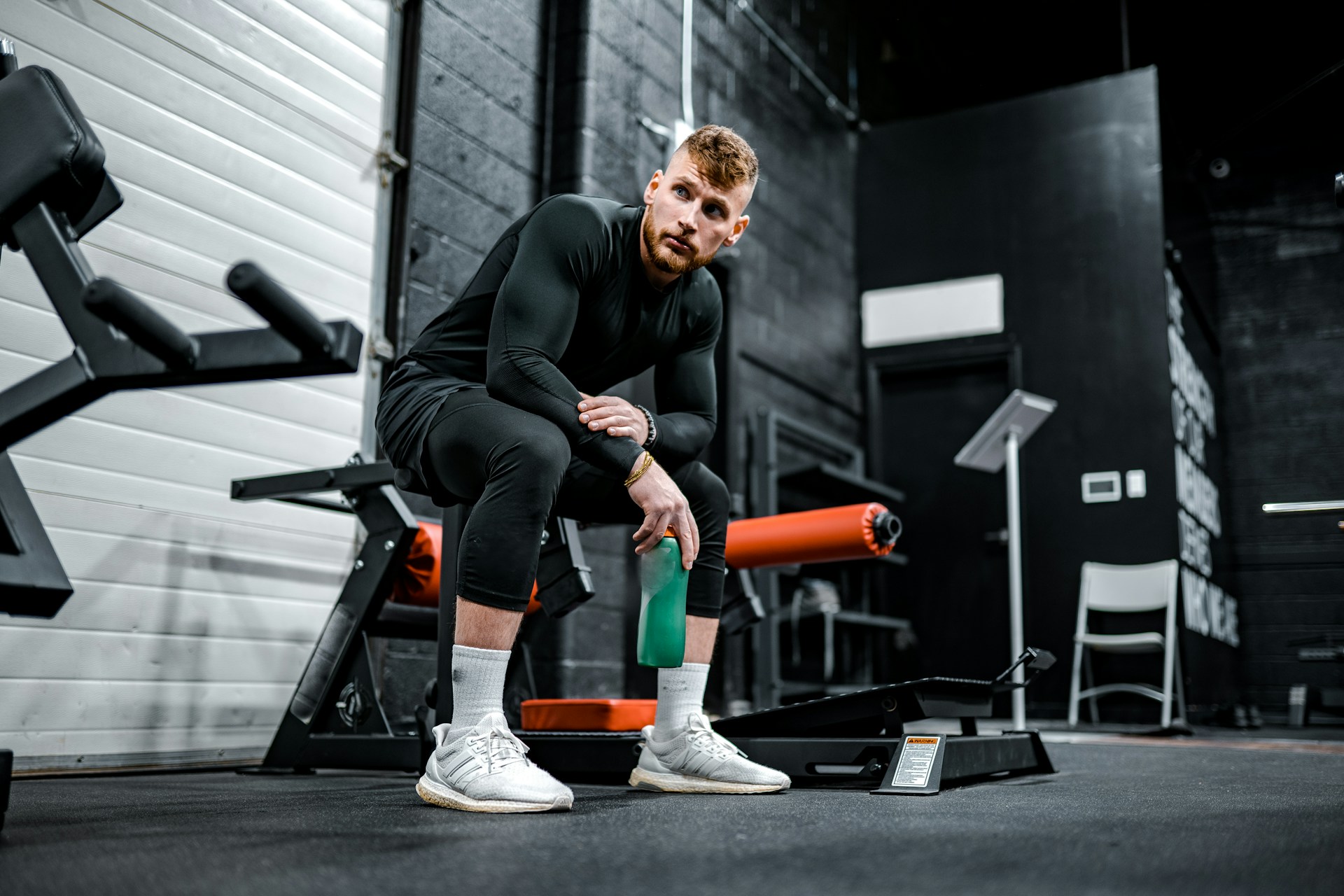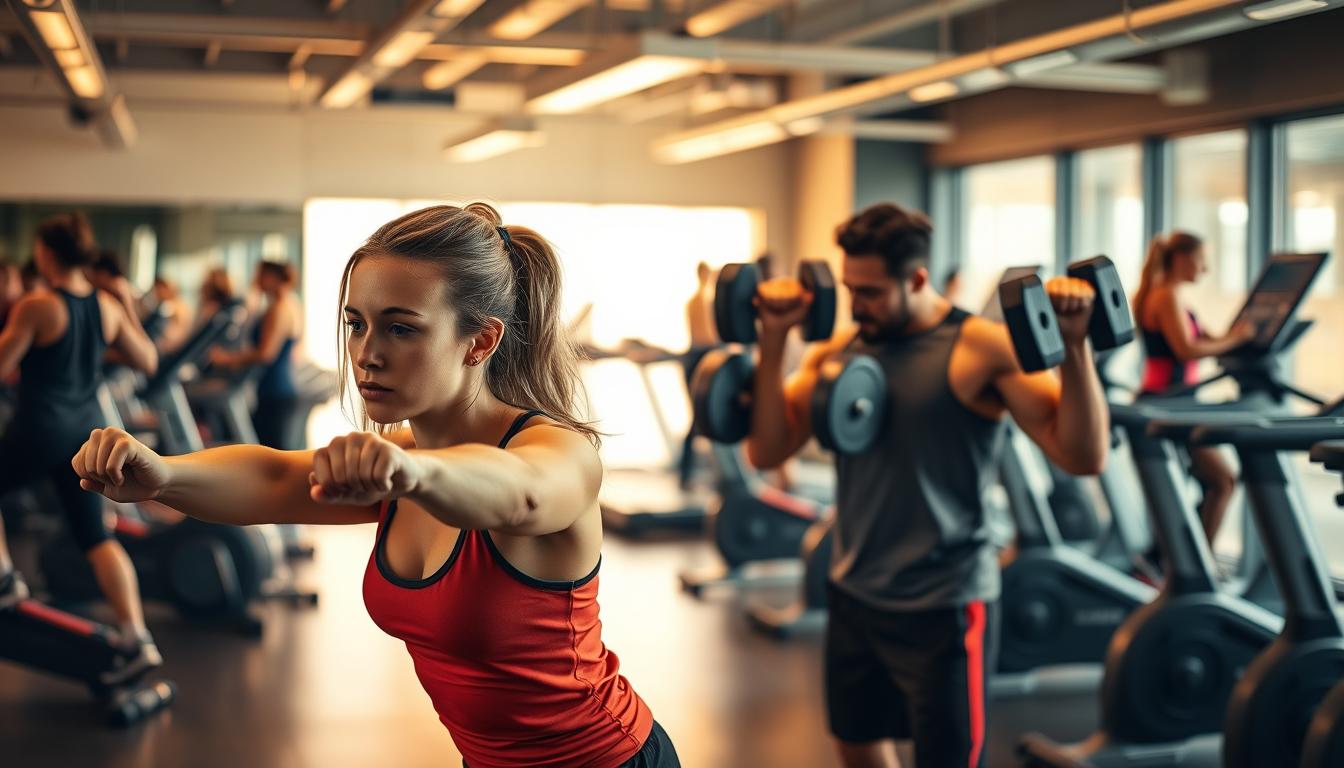Did you know that nearly 70% of your fitness results come from what you eat? This fact shows how important nutrition is for reaching your health and fitness goals. Eating the right foods boosts your workout performance, speeds up recovery, and boosts your overall health.
This guide will help you use nutrition to improve your fitness. You’ll learn how to eat well for workouts, understand healthy eating, and add a balanced diet to your life. Get ready to take your workouts to the next level with our detailed fitness nutrition guide!
Key Takeaways
- Proper nutrition can account for up to 70% of your fitness results.
- Eating the right foods improves workout performance and recovery.
- Incorporating balanced meals is key for sustaining energy levels.
- Understanding essential nutrients can significantly enhance your fitness journey.
- Meal planning is crucial for effective nutrition management.
Understanding the Role of Nutrition for Fitness
Knowing how nutrition impacts your workouts is key to reaching your fitness goals. Good food acts as fuel for your body. It affects your energy, how fast you recover, and how well you do in your workouts. Studies show that eating right can boost endurance and strength, making you perform better overall.
Why Nutrition Matters for Your Workouts
Nutrition is more than just food. A balanced diet, full of vitamins for fitness, gives your body the energy it needs. Carbs, proteins, and fats are crucial for physical activities. People who focus on their diet see big improvements in their workout results.
The Science Behind Food and Exercise Performance
The link between what you eat and how you exercise is interesting. Carbs give quick energy for intense workouts. Proteins help muscles recover and grow. Healthy fats provide energy for longer activities. When planning your diet, remember how important nutrition is for your workouts. This helps you make choices that support your fitness goals.
| Nutrient | Role in Fitness | Sources |
|---|---|---|
| Carbohydrates | Primary energy source for exercise | Pasta, rice, fruits |
| Proteins | Muscle repair and growth | Chicken, fish, legumes |
| Fats | Sustained energy for prolonged effort | Nuts, avocados, olive oil |
Building a Nutrient-Rich Diet for Fitness Goals
To reach your fitness goals, you need a diet full of nutrients. These nutrients help your body work well during exercise and recover fast. Knowing what nutrients to eat and choosing the right foods can boost your performance.
Essential Nutrients for Peak Performance
To fuel your body right, add these nutrients to your meals:
- Carbohydrates: They give you quick energy and should be a big part of your diet.
- Proteins: They help fix muscles. Look for quality sources like chicken, fish, beans, and legumes.
- Fats: Healthy fats, like those in avocados and nuts, give long-lasting energy and help with recovery.
- Vitamins and Minerals: They’re key for your body’s functions, like fighting off sickness and making energy.
Whole Foods vs. Processed Foods: Making the Right Choice
Choosing whole foods over processed ones is key for your fitness journey. Foods like fruits, veggies, whole grains, and natural proteins are packed with nutrients. They help you reach your fitness goals. On the other hand, processed foods have added sugars and unhealthy fats that can slow you down.
Here’s a table that shows the difference between whole foods and processed foods:
| Nutrient | Whole Foods | Processed Foods |
|---|---|---|
| Vitamins | Rich in vitamins and minerals | Often stripped of nutrients |
| Fiber | High fiber content | Lower fiber content |
| Added Sugars | No added sugars | High levels of added sugars |
| Long-Term Energy | Provides sustained energy | May cause energy spikes and crashes |
Eating a diet rich in whole, nutrient-dense foods is perfect for exercise. It boosts your performance. Make sure to choose foods that help you reach your fitness goals with every meal.
Meal Planning for Workouts: Fueling Your Fitness Journey
Planning your meals for workouts is key to better performance and recovery. A good plan makes sure you get the nutrients you need and helps you reach your fitness goals. It’s about making balanced meals with the right mix of proteins, carbs, and fats. Also, timing these meals right can boost your workout results.
Creating Balanced Meals for Fitness
Balanced meals for fitness should have high-quality protein, healthy fats, and complex carbs. Here’s what to include in your meals:
- Proteins: Chicken, fish, legumes, and tofu are great sources.
- Carbohydrates: Whole grains, fruits, and vegetables provide necessary energy.
- Fats: Avocado, nuts, and olive oil contribute to overall health.
Adding these elements helps make meals that keep energy up during workouts and aid in recovery.
Pre-Workout and Post-Workout Meal Ideas
For pre-workout meals, choose quick, energy-boosting foods. Here are some ideas:
- A banana with almond butter.
- Greek yogurt with honey and berries.
- Oatmeal topped with nuts and fruit.
Post-workout meals are vital for recovery and muscle repair. Here are some nutritious options:
- Grilled chicken with quinoa and steamed broccoli.
- Salmon with sweet potatoes and asparagus.
- A smoothie with spinach, protein powder, and a banana.

Protein Intake for Exercise Success
Understanding protein intake for exercise is key to reaching your fitness goals. Eating enough protein helps repair muscles and fuels your workouts. It also supports your overall health. Knowing how much protein you need can greatly improve your performance and recovery.
How Much Protein Do You Really Need?
How much protein you need depends on several factors. These include your age, gender, body weight, and how active you are. Most active people need between 1.2 to 2.0 grams of protein per kilogram of body weight.
For example, if you weigh 70 kg, you might need 84 to 140 grams of protein daily. Health organizations like the Academy of Nutrition and Dietetics offer guidelines. They help you meet your fitness goals.
Best Sources of Protein for Fitness Enthusiasts
Finding the right protein sources is crucial for muscle growth and recovery. Both animal and plant-based proteins are important. Here are some top sources:
- Lean meats like chicken, turkey, and beef
- Fish, especially fatty varieties such as salmon and tuna
- Dairy products like Greek yogurt, cheese, and milk
- Legumes such as lentils, chickpeas, and black beans
- Nuts and seeds, including almonds, chia seeds, and quinoa
Adding these protein-rich foods to your diet boosts your nutrition. Mixing animal and plant-based proteins offers variety. It also ensures you get all the nutrients you need for fitness.
Conclusion
Understanding nutrition’s role in fitness is key to reaching your goals. Eating right before and after workouts gives you the energy to perform well. It also helps you recover faster. This is about more than just getting better at workouts. It’s about living a healthy life through smart choices.
Using the nutrition tips from this guide will help you get the most out of your workouts. A diet full of nutrients fuels your body and boosts your health. Planning your meals and choosing healthy foods can greatly improve your energy and workout results.
Success in fitness comes from a mix of exercise and good nutrition. Remember, the path to top performance is through careful eating. By focusing on nutrition, you’re on your way to a healthier, more energetic life. You’ll find joy and success in reaching your physical goals.
FAQ
Why is nutrition important for my workouts?
Nutrition is key for your workouts because it gives your body the energy and nutrients it needs. A balanced diet boosts endurance, helps with recovery, and improves performance. It’s vital for reaching your fitness goals.
What are essential nutrients for my fitness journey?
You need carbs for quick energy, proteins for muscle repair, fats for lasting energy, and vitamins and minerals for health. Eating a variety of whole foods helps meet these needs.
How can I create balanced meals for my fitness routine?
Aim for a mix of proteins, carbs, and healthy fats in your meals. Eat whole foods like lean meats, whole grains, fruits, and veggies. This ensures you get the nutrients you need for workouts.
How much protein do I need for exercise?
Protein needs vary based on age, gender, weight, and activity level. Aim for 1.2 to 2.0 grams of protein per kilogram of body weight, especially with intense exercise.
What are some good sources of protein for fitness enthusiasts?
Good protein sources include lean meats, fish, eggs, dairy, legumes, and plant-based options like tofu and quinoa. Mixing these in your meals supports your fitness goals.
What should I eat before and after a workout?
Eat a mix of carbs and proteins before working out, like a banana with peanut butter or yogurt with fruit. After, choose a meal rich in protein and carbs, like chicken salad or a smoothie with protein powder and fruits.
How can I improve my nutrition for fitness?
Begin by watching what you eat and eating a variety of nutrient-rich foods. Meal planning helps make healthier choices. Remember to drink plenty of water and consider supplements for vitamins if necessary.
What are some nutrition tips for working out effectively?
Eat whole foods, keep meals balanced, and focus on pre and post-workout nutrition. Make sure to get enough protein and adjust your diet as needed. Learning about nutrition is key to better workout results.



